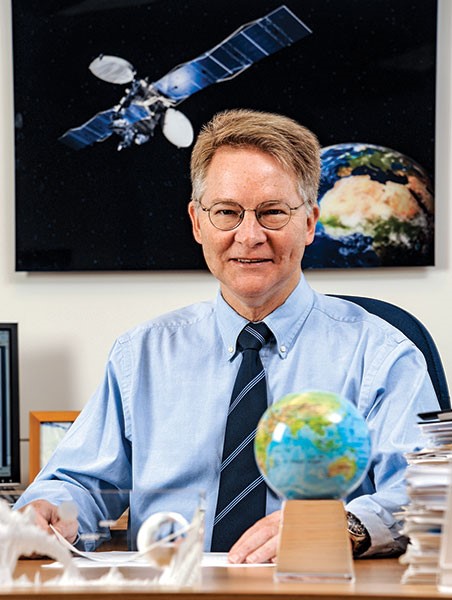2019 PRESS/PHOTO INFORMATION
Press Release
RNASA's 2019 Stellar Awards Winners
Rotary National Award for Space Achievement
May 7, 2019
Media Contact: Lindsey Cousins, 281-723-5683, lindsey@baysidegraphics.net
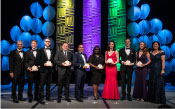
Stellar Award Winners – Early Career
L to R: Mark Vande Hei (presenting), Samuel Anderson, Peter Carow, Dr. William Q. Walker, Capt. Sean M. Frederick, Ebony J. Bowens, Kathleen S. Bonner, Dr. Joseph Shoer, Cassie Wong, Dr. Shannon Walker (presenting). Not pictured: Capt. Andrew R. Hilton.
See full size.
(RNASA Photo, 2019)
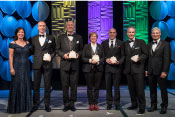
Stellar Award Winners – Mid Career
L to R: Dr. Shannon Walker (presenting), Timothy J. Lindsey, Dr. Edward B. Bierhaus, Laura A. Shaw, Timothy P. Pepe, Matthew T. Jakubek, Mark Vande Hei (presenting). Not pictured: Marc A. Gibson.
See full size.
(RNASA Photo, 2019)
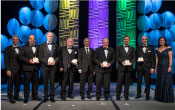
Stellar Award Winners – Late Career
L to R: Mark Vande Hei (presenting), Federico Merheb, William A. Johns, Don R. Wilbanks, Dr. Tushar K. Ghosh, Gary F. Stewart, Brian Sutter, Stanley A. Bouslog, Shannon Walker (presenting). Not pictured: Dr. Louis Ghosn, William D. Manha.
See full size.
(RNASA Photo, 2019)
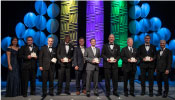
See full size.
Stellar Award Winners – Team - L to R: Dr. Shannon Walker (presenting), Tommy Barron (METTS SLS Core Stage Structural Test Article Instrumentation Installation Team of Aerie Aerospace), Matthew Jakubek (CST-100 Starliner Crew Module Reaction Control System (CM RCS) Thruster Development Team of Aerojet Rocketdyne), Michael Bradley (Aerojet Rocketdyne AR22 10X10 Test Team), Unidentified team member, Mark Hancock (AR-22 Engine Integrated Test Team of NASA Stennis Space Center), Stuart Spath (Lockheed Martin InSight Launch & Landing Team), Jeffrey Coots (Boeing SLS Engine Section Test Article Team), Brian Richard (Lockheed Martin Orion European Service Module Integration & Delivery Team), Mark Vande Hei (presenting).
(RNASA Photo, 2019)
Every year, the aerospace community anxiously awaits the announcement of the Rotary National Award for Space Achievement (RNASA) Stellar Award winners. The 2019 Stellar Awards Evaluation Panel, Arnold Aldrich, Eileen Collins, Michael Coats, and Kevin Chilton ranked the winners based on whose accomplishments have advanced U.S. space capabilities and hold the greatest promise of future capabilities. Out of 140 nominations received, the Foundation selected the top 24 individuals and 7 teams for recognition.
Prior to the evening's festivities, all nominees were treated to a behind-the-scenes tour of the Johnson Space Center and a luncheon at the Hilton Houston NASA Clear Lake. Stellar Awards Committee Chair Jennifer Devolites welcomed the nominees and then said, "You are here because you are excellent," and spoke about qualities of leadership at every level. RNASA Foundation chairman Rodolfo Gonzalez, and Space Center Rotary President Nancy Anderson also welcomed and addressed the nominees.
Scott Tingle was the featured speaker at the Stellar Awards Luncheon. Tingle was selected as a member of NASA's 20th Astronaut class in July 2009. He served as the Flight Engineer for Expedition 54/55, which launched on December 17, 2017. During the 168-day mission, Tingle worked on hundreds of scientific experiments and dozens of educational events as part of NASA's Year of Education on Station.
Each nominee received a Fisher Space Pen donated by the company. The Fisher Space Pen was originally carried by the astronauts of the Apollo moon missions and is still used on human space flights to this day. They are precision assembled, hand-tested, and guaranteed to perform underwater, at any angle including upside down, in extreme temperatures, and of course in zero gravity.
All of the Stellar nominees had their photo taken as they received a special commemorative certificate with a United States flag that was flown to the International Space Station aboard the SpaceX-11 flight, June 5, 2017 through July 3, 2017.
The Stellar Award winners were announced at the RNASA evening gala on April 26, 2019 by Astronauts Mark Vande Hei and Shannon Walker, who presented them with engraved marble trophies sponsored by Northrop Grumman. The winners in each of the four categories, Early Career, Mid-Career, Late Career and Team are:
2019 Stellar Award Winners in the Early Career Category
Samuel Anderson of Collins Aerospace - Exceptional technical leadership to advance additive manufacturing applications for safety and fracture-critical human spaceflight hardware.
Kathleen S. Bonner of Northrop Grumman Innovation Systems - Outstanding leadership of Orion attitude control motor valve IPT development and qualification, and distinguished community service through STEM activities.
Ebony J. Bowens of The Boeing Company - Demonstrated leadership, technical accomplishments, and expertise leading the installation, operation, and integration of the International Space Station's new lithium ion batteries on-orbit.
Peter Carow of Oceaneering Space Systems - Outstanding technical knowledge, unwavering attention to detail, and exemplary work ethic in the development of the DARPA Robotic Servicing of Geosynchronous Satellites (RSGS) Tool Changer project.
Capt. Sean M. Frederick of the United States Air Force - Successful development, delivery, and fielding of a classified, revolutionary capability for a multi-billion-dollar initiative that is reshaping military satellite communications.
Capt. Andrew R. Hilton of the United States Air Force - Outstanding achievements solving complex technical problems on space vehicles, leading to numerous successful satellite deliveries and GPS capabilities to billions of users worldwide.
Dr. Joseph Shoer of Lockheed Martin - Innovative leadership in adapting large program systems engineering and Assembly Test & Launch Operations (ATLO) practices to smaller missions, such as CubeSats, for emerging commercial space markets and government agencies.
Dr. William Q. Walker of NASA Johnson Space Center - Exceptional technical achievements and leadership in supporting NASA's development of safer lithium ion battery systems.
Cassie Wong of Northrop Grumman - Outstanding leadership and exemplary performance in leading the efforts to develop, test and operationally deploy the Cygnus Common Communications for Visiting Vehicles (C2V2) ISS communications system and other emerging space components.
2019 Stellar Award Winners in the Mid-Career Category
Dr. Edward B. Bierhaus of Lockheed Martin - Outstanding contributions to the field of planetary science that successfully combine scientific research with sound engineering implementation, resulting in high-value science for the knowledge of all humankind.
Marc A. Gibson of NASA Glenn Research Center - Outstanding leadership of the groundbreaking Kilopower Reactor Using Stirling Technology (KRUSTY) experiment, paving a path for NASA space fission power systems.
Matthew T. Jakubek of Aerojet Rocketdyne - Exceptional leadership of the successful development, qualification, and delivery of the CST-100 Starliner CM RCS monopropellant thrusters.
Timothy J. Lindsey of KBRWyle - Outstanding development and coordination in the field of astronaut EVA training and efficient EVA execution.
Timothy P. Pepe of Lockheed Martin - Outstanding leadership associated with driving the successful delivery of hundreds of first-time development mechanisms and pyrotechnic devices for human spaceflight and the Orion Spacecraft Program.
Laura A. Shaw of NASA Johnson Space Center - Exemplary development, certification, and demonstration of innovative hardware and flight techniques to fully utilize the International Space Station as an engineering testbed for Exploration-class Environmental Control and Life Support Systems.
2019 Stellar Award Winners in the Late Career Category
Stanley A. Bouslog of NASA Johnson Space Center - Exceptional leadership and technical contributions to NASA's aerothermodynamics and thermal protection system communities, leading to success of the Space Shuttle, Orion and advanced TPS development efforts.
Dr. Tushar K. Ghosh of CACI, Inc. - Critical spacecraft dynamics support to the U.S. human spaceflight program for over 30 years.
Dr. Louis Ghosn of NASA Glenn Research Center - Exceptional knowledge and expertise in the fields of structural and fracture mechanics, contributing to the success of numerous NASA missions.
William A. Johns of Lockheed Martin - Extraordinary excellence and innovation in space exploration mission success.
William D. Manha of Jacobs - Exemplary life-long career as a pressure system safety expert, enhancing the ability to perform exploration and science activities in space.
Federico Merheb of The Boeing Company - Outstanding technical leadership in design, testing and troubleshooting of purge, vent, and hazardous gas (PV&HG) detections systems, influencing numerous past, present, and future space vehicles including SSP Orbiter, SLS Core Stage, SLS Exploration Upper Stage, and Boeing's Phantom Express.
Gary F. Stewart of Collins Aerospace - Exceptional dedication, hard work, and technical excellence in testing and verification of new designs of complex flight hardware supporting NASA and Navy space programs.
Brian Sutter of Lockheed Martin - Outstanding technical expertise in space orbital mechanics and leadership of the design, development and implementation for NASA's planetary missions.
Don R. Wilbanks of Jacobs - Superior performance in the execution of structural testing supporting the Apollo, Apollo-Soyuz, Space Shuttle, ISS, and Orion Programs.
Stellar Award Winners – Team
Boeing SLS Engine Section Test Article Team - Outstanding team accomplishment in successfully testing the first major structural qualification article for the Space Launch System, proving structural confidence in the design of the engine section of the world's most powerful rocket.
Lockheed Martin InSight Launch & Landing Team - Outstanding accomplishment in the successful design, development, launch and landing of InSight on Mars, marking Lockheed Martin's fourth Mars mission landing with NASA – an accomplishment no other company or nation has achieved.
Aerojet Rocketdyne AR22 10X10 Test Team - Exceptional performance throughout the AR22 test program sequence of ten tests in ten days at NASA's Stennis Space Center.
AR-22 Engine Integrated Test Team of NASA Stennis Space Center - Outstanding teamwork in safely and successfully conducting the AR-22 test project, which included an unprecedented 10 hot-fires in under 240 hours.
CST-100 Starliner Crew Module Reaction Control System (CM RCS) Thruster Development Team of Aerojet Rocketdyne - Successful development, qualification, and delivery of the CST-100 Starliner CM RCS monopropellant thrusters.
METTS SLS Core Stage Structural Test Article Instrumentation Installation Team of Aerie Aerospace - Exceptional dedication and craftsmanship for the successful instrumentation installation on NASA's Space Launch System (SLS) core stage structural test articles.
Lockheed Martin Orion European Service Module Integration & Delivery Team - Successful delivery and integration of the European Service Module (ESM) for Orion's Exploration Mission-1 flight test to the far side of the Moon and back.
The Rotary National Award for Space Achievement (RNASA) Foundation's black tie Gala on April 26, 2019, was recorded live, in its entirety, by Space City Films and is available on website at http://www.rnasa.org/agenda.html. Visit http://www.rnasa.org/photos.html for images from the event.
About the RNASA Foundation: The Rotary National Award for Space Achievement (RNASA) Foundation was founded by the Space Center Rotary Club of Houston, Texas in 1985 to organize and coordinate an annual event to recognize outstanding achievements in space and create greater public awareness of the benefits of space exploration. The National Space Trophy and other awards were presented this year at the RNASA Gala on April 26, 2019. See http://www.rnasa.org for more information
Read the press release as a Word document.
Press Release
RNASA Foundation Honors David Thompson, William Shatner, and Stellar Winners
Rotary National Award for Space Achievement
May 6, 2019
Media Contact: Lindsey Cousins, 281-723-5683, lindsey@baysidegraphics.net
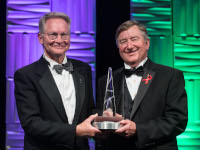
David Thompson is presented with the 2019 RNASA National Space Trophy by Mr. Frank Culbertson
See full size.
(RNASA Photo, 2019)
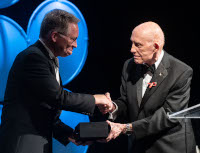
David Thompson receives the Omega Watch from Thomas Stafford during the 33rd annual RNASA Banquet
See full size.
(RNASA Photo, 2019)
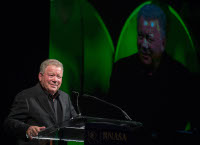
William Shatner, recipient of the 2018 RNASA Space Communicator Award, delivers remarks during the 2019 gala
See full size.
(RNASA Photo, 2019)
RNASA Foundation Chairman Rodolfo González welcomed the guests to gala, saying that "the foundations mission is to encourage, recognize, honor, and celebrate US space achievement. The members of the foundation truly appreciate the enormity of the work that is represented by tonight's audience."
The Clear Brook High School JROTC Color Guard presented the colors, followed by the Clear Creek High School Chamber Singers Solo Quartet who sang the National Anthem. Reverend Tracye Ruffin, retired Hospice Chaplain, Disciples of Christ-Christian Church, gave the invocation.
After dinner, the program kicked off with a year-in-review film by Space City Films. Morgan Brennan, CNBC Reporter and co-host of Squawk Alley served as the emcee. Morgan said, "from a news standpoint there could not be any more exciting time as far as I'm concerned to be covering this industry."
Bob Jacobs, NASA's Deputy Assistant Administrator for the Office of Communications, welcomed honored guest William Shatner, best known for his role as Captain James Kirk of Star Trek's USS Enterprise, saying that "I know his work has touched everyone in this room?And it inspired most people here to do what they're doing today." Mr. Shatner shared his thoughts about mankind's hunger for adventure this way, "what is inside our heads that compels us to set forth on the precipice of existence? For what? Is it ego? Is it pride? Is it a death wish? Is it the sense of adventure that propels the human spirit into unfamiliar modes, into life threatening environments because the challenge is there? Is it humanity's need to experience the unknown to grasp it, embrace it, absorb the experience as only a human can? Yeah, the challenge of life over death, that's it."
Stellar Awards were presented to 24 individuals and 7 teams. The Stellar Award winners were announced by NASA Astronaut Mark Vande Hei, and NASA Astronaut Shannon Walker, who then presented them with engraved marble trophies sponsored by Northrop Grumman. The Stellar Awards were presented in Early Career, Mid-Career, Late Career, and Team categories.
NASA Astronaut Anne McClain, sent a congratulatory message down from the International Space Station to Thompson, telling him "Your pioneering contributions to the development of spacecraft and launch vehicles like the Antares rockets and Cygnus resupply vehicle have made a tremendous impact on our ability to do our mission here in orbit."
Frank Culbertson, retired NASA Astronaut, presented the prestigious 2019 National Space Trophy to David Thompson. In his introductory comments, Culbertson said "Dave is mister commercial space flight. Dave is the American dream of people succeeding in space on a commercial basis and industry." While accepting the NST, Thompson commented on the growth of his company, saying "in the end our somewhat improbable experiment in space entrepreneurship, despite being a very close-run affair at various times, actually worked out pretty well. ?Beyond the individual stories or Orbital?., I believe there is a more important long-term lesson to be found in the collective experiences of first-generation space businesses. In the last forty years?companies have demonstrated that commercial space activities can become large, sustainable, value creating enterprises. They can develop and provide products and services that meet the practical needs of diverse customers on Earth."
Lt. Gen Thomas P. Stafford, USAF (Ret.), Gemini and Apollo astronaut, and the 1993 National Space Trophy winner, presented an OMEGA speedmaster watch to Thompson. Stafford congratulated Thompson saying, "what an outstanding job you've done starting with an idea and building a great company and also benefitting so many things."
SAIC donated the portrait of Thompson by Pat Rawlings, which was on display at the gala and used as the cover of the souvenir program. The portrait will become part of the National Space Trophy display at Space Center Houston for one year.
RNASA Chairman Rodolfo González concluded the evening by thanking the Foundation's corporate sponsors whose support and achievements made the event possible: a.i. solutions, Inc., Aerojet Rocketdyne, The Aerospace Corp, ARES Corporation, ASRC Federal, Barrios Technology, Bastion Technologies, Inc., The Boeing Company, Booz Allen Hamilton, CACI International, Collins Aerospace, Deloitte, Dynetics, ERC, Inc, Jacobs, KBRwyle, Leidos, Lockheed Martin, MEI Technologies, Inc., MORI Associates, Inc., MRI Technologies, Northrop Grumman, Oceaneering International, Inc., Raytheon, SAIC, Sierra Nevada Corporation, SpaceX United Launch Alliance, Vericon Technical Services.
Visit http://www.rnasa.org/photos.html for images from the event.
The Rotary National Award for Space Achievement (RNASA) Foundation's black tie Gala on April 26, 2019, was recorded live, in its entirety, by Space City Films and will be accessible on the website's agenda page, www.rnasa.org/agenda.html.About RNASA: The Rotary National Award for Space Achievement (RNASA) Foundation was founded by the Space Center Rotary Club of Houston, Texas in 1985 to organize and coordinate an annual event to recognize outstanding achievements in space and create greater public awareness of the benefits of space exploration. The nonprofit Foundation presents the National Space Trophy and Stellar Awards each year.
Read the press release as a Word document.
Press Release
Rotary Gala Honors Heroes of Space
Rotary National Award for Space Achievement
March 25, 2019
Media Contact: Lindsey Cousins, 281-723-5683, lindsey@baysidegraphics.net
The Rotary National Award for Space Achievement (RNASA) Foundation will recognize people in the space industry at their annual space awards gala on Friday, April 26, 2019, at the Houston Hyatt Regency.
The RNASA Foundation was formed by the Space Center Rotary Club in 1985, to publicly recognize the unsung heroes of America's space program alongside the more well-known achievers. This year, the RNASA Foundation will present the 2019 National Space Trophy, to Mr. David W. Thompson, retired President and CEO of Orbital ATK.
Former NASA Astronaut, Mr. Frank Culbertson, will present the prestigious award to Mr.Thompson. Special guest speakers will include Mr. William Shatner, best known for his role as Captain James Kirk, NASA Administrator Jim Bridenstine, former Rotary International President Ron Burton and NASA Spokesperson, Bob Jacobs.
Morgan Brennan, co host of CNBC's Squawk Alley, will serve as Emcee and Gemini/Apollo Astronaut Lt. Gen. Thomas Stafford, USAF (Ret.), will present an OMEGA watch to Thompson at the closing of the program.
The National Space Trophy honoree is selected each year by the RNASA Foundation's Board of Advisors. This board represents a Who's Who of government and corporate aerospace leaders, including former Trophy and Space Communicator Award recipients.
In addition to the National Space Trophy, stellar awards will be presented to people in early career, mid career, late career, and team categories. RNASA Chairman Rodolfo González said, "We received an impressive 140 stellar nominations this year, 36 government and 104 corporate." The nominations came from Aerie Aerospace, Aerojet Rocketdyne, ARES Corporation, The Boeing Company, Booz Allen Hamilton, CACI, Inc., Collins Aerospace, Jacobs, KBRWyle, Leidos, Lockheed Martin, MRI Technologies, NASA Glenn Research Center, NASA Goddard Space Flight Center, NASA Johnson Space Center, NASA Kennedy Space Center, NASA Langley Research Center, NASA Marshall Space Flight Center, NASA Stennis Space Center, Northrop Grumman Innovation Systems, Oceaneering Space Systems, Raytheon Company, SAIC, Sierra Nevada Corporation, SpaceX, United Launch Alliance, and the US Air Force.
Of all the nominations, only a few Stellar awards are given, and are announced the evening of the banquet. The winners will receive engraved marble trophies generously sponsored by Northrop Grumman. The trophies will be presented by NASA Astronauts Mr. Mark Vande Hei and Dr. Shannon Walker.
The RNASA Stellar Awards Evaluation Panel ranks the nominations received from industry and government in all categories, based on whose accomplishments hold the greatest promise for furthering activities in space and the extent to which the nominee meets the goal of recognizing"unsung heroes". The 2019 Stellar judges are Michael Coats, Arnold Aldrich, Eileen Collins, and Kevin Chilton.
The Stellar Award nominees and team representatives will enjoy a behind-the-scenes tour of the Johnson Space Center and a luncheon where all are recognized with mounted certificates and a Fisher Space Pen donated by the company. The Fisher Space Pen was originally carried by the astronauts of the Apollo moon missions and is still used on manned space flights to this day. They are precision assembled, hand tested, and guaranteed to perform underwater, at any angle including upside down, in extreme temperatures, and of course in zero gravity. The keynote speaker at the luncheon will be astronaut Scott Tingle.
The Stellar Awards Committee Chairman Jennifer Devolites, RNASA Foundation Chairman Rodolfo González, RNASA Committee member Duane Ross, and Space Center Rotary Club President Nancy Anderson will also address the nominees at the Stellar Awards luncheon.
The reception begins at 6 p.m., and the program starts at 7 p.m with a welcome by RNASA Chairman Rodolfo González. Following will be a presentation of the colors by Clear Brook High School Army JROTC, accompanied with the national anthem sung by the Clear Creek High School Chamber Singers Solo Quartet. Reverend Tracye Ruffin, Retired Hospice Chaplain, Disciples of Christ-Christian Church will provide the invocation. After dinner, the awards ceremony will kick off with a multimedia show summarizing the year's space events produced by Space City Films.
The RNASA Foundation invites members of the public and the aerospace community to attend the black-tie event. Individual tickets are $300, and corporate tables range from $2,500 to $5,500. Please use http://www.rnasa.org/tables.html to reserve your table for the RNASA Banquet, and for information about sponsorships and tickets. To reserve a hotel room, please visit http://www.rnasa.org/houston.html at the Houston Hyatt Regency.
About RNASA: The Rotary National Award for Space Achievement (RNASA) Foundation was founded by the Space Center Rotary Club of Houston, Texas, in 1985 to organize and coordinate an annual event to recognize outstanding achievements in space and create greater public awareness of the benefits of space exploration. The nonprofit Foundation presents the National Space Trophy and Stellar Awards each year.
Read the press release as a Word document.
Press Release
William Shatner to Attend 2019 RNASA Banquet as an Honored Guest
Rotary National Award for Space Achievement
March 18, 2019
Media Contact: Lindsey Cousins, 281-723-5683, lindsey@baysidegraphics.net
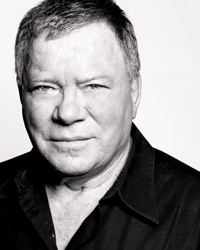
William Shatner, Honored Guest and 2018 Space Communicator Award Recipient
See full size.
(Manfred Baumann Photo)
The RNASA Foundation was founded by the Space Center Rotary Club of Houston, Texas, in 1985 to organize and coordinate an annual event to recognize outstanding achievements in space and create greater public awareness of the benefits of space exploration. The nonprofit Foundation presents the National Space Trophy and Stellar Awards each year. This year's NST will be presented to Mr. David Thompson, retired President and CEO of Orbital ATK.
Shatner has long been an advocate of international space exploration efforts. In recent years, he has supported numerous NASA outreach activities to educate the public and to inspire a new generation of explorers, leading to his selection for the RNASA Space Communicator Award in 2018.
In 2011, Shatner donated his time in honor of Space Shuttle Discovery's final flight. He recreated the famous Star Trek introduction for the crew of STS-133 saying, "These have been the voyages of the space shuttle Discovery. Her 30-year mission: to seek out new science, to build new outposts, to bring nations together in the final frontier, to boldly go and do what no spacecraft has done before." He also narrated the space shuttle 30th anniversary documentary.
In 2012, Shatner narrated the Grand Entrance to Mars presentation which guided viewers through Curiosity's complex landing on the Martian surface. In order to make a successful soft landing, the Curiosity spacecraft had seven minutes to slow down from 13,000 mph as it rocketed through the atmosphere. It was appropriately dubbed the "seven minutes of terror".
He continued his support in the fall of 2017 by sending a message to the Voyager spacecraft on its 40th anniversary. It read "We offer friendship across the stars. You are not alone." Launched in 1977, the Voyager probe is beaming back data from the furthest reaches of our solar system. As of January 2018, Voyager was 13 billion miles from Earth.
The RNASA Foundation invites members of the public and the aerospace community to attend the black-tie event on April 26, 2019, at the Houston Hyatt Regency. This year will be RNASA's 33rd annual Space Awards Gala.
Please visit http://www.rnasa.org/tables.html to reserve your table for the RNASA Space Awards Gala and find information about sponsorships and tickets. To reserve a room at the Houston Hyatt Regency, please visit http://www.rnasa.org/houston.html or call 713-654-1234 and request the RNASA group rate.
Read the press release as a Word document.
Press Release
Mr. David W. Thompson, Retired President and CEO of Orbital ATK, to receive the 2019 National Space Trophy
Rotary National Award for Space Achievement
January 10, 2019
Media Contact: Lindsey Cousins, 281-723-5683, lindsey@baysidegraphics.net
Rodolfo González, President of the RNASA Foundation said, "The RNASA Foundation is extremely excited about recognizing Mr. Thompson as the guest of honor at the 2019 RNASA Space Award Gala."
Mr. Thompson was nominated for the award by Captain Frank Culbertson (U.S. Navy, ret.), of Northrop Grumman Corporation. In recommending Thompson, Culbertson cited his "four decades of outstanding leadership and pioneering innovations in the development and operation of launch vehicles and satellite systems, which have transformed scientific, exploratory, commercial and defense applications of space."
Thompson said, "It is with great enthusiasm, and even greater humility, that I accept the 2019 National Space Trophy! My heart-felt thanks to the RNASA Board of Advisors for selecting me for this highly-regarded honor."
Thompson began his four-decade long career in space technology as a young engineer at NASA's Marshall Space Flight Center in 1978, following summer internships during college and graduate school at the Jet Propulsion Laboratory, Johnson Space Center and Langley Research Center. His career as a space entrepreneur and business leader accelerated in the early 1980's when he and two Harvard Business School classmates founded Orbital Sciences Corp., a startup that focused on the development of space systems for commercial, military and scientific customers. Over the subsequent 35 years, Thompson led his company from its infancy to Fortune 500 status, reaching more than $5 billion in annual revenue and employing nearly 15,000 people in 2018.
As one of the world's first commercial space enterprises, Orbital pioneered the investment of private capital for space systems development and manufacturing in the 1980's and 1990's. During this time, the company created a family of six new launch vehicles, including the Pegasus rocket and several missile defense vehicles, as well as an array of lower-cost satellites for both low-Earth orbit (LEO) and geosynchronous (GEO) applications. Thompson's vision was that diverse customers - from traditional government agencies to new privately-owned satellite operators - would use these products, and that commercial-style business practices would reduce their costs and delivery times. The success of this strategy is reflected in the more than 1,000 rockets and satellites delivered by the company to over 50 customers since the 1980's.
Under Thompson's leadership, Orbital expanded beyond its original business of research and manufacturing into providing space-based services in the 1990's and 2000's. New ventures in those decades included its ORBCOMM satellite data and messaging system, the first global network based on dozens of small LEO satellites, and its ORBIMAGE commercial satellite imaging fleet, which pioneered privately-owned remote sensing spacecraft. More recently, the company partnered with NASA to develop the Antares rocket and Cygnus spacecraft commercial cargo system for the International Space Station (ISS), which has conducted 12 supply missions to ISS over the past six years. And later this year the company plans to inaugurate the world's first in-space robotic servicing and repair of GEO communications satellites, launching an exciting new form of commercial space logistics operations.
In 2014, Orbital and its long-standing industry partner, Alliant Techsystems, merged to form Orbital ATK, a larger, more diversified space and defense systems company with a broader product line, including rocket propulsion for NASA's Space Launch System (SLS) heavy-lift vehicle as well as motors for tactical and strategic missiles. Finally, last year Northrop Grumman purchased Orbital ATK for over $9 billion, forming Northrop's Innovation Systems business sector. The merger with Northrop is expected to generate faster growth and new products, as well as creating greater opportunities for thousands of the company's space engineers and scientists.
Thompson earned his B.S. in Aeronautics and Astronautics from Massachusetts Institute of Technology, a M.S. in Aeronautics from Caltech, and an MBA from Harvard Business School. He is an Honorary Fellow of the American Institute of Aeronautics and Astronautics (AIAA), a Fellow of the American Astronautical Society and the Royal Aeronautical Society, and a member of the U.S. National Academy of Engineering and the International Academy of Astronautics. He was AIAA's President for the 2009-2010 year, and today serves as a member of the Boards of Trustees of Caltech, the Aerospace Corporation, the Carnegie Institution for Science, the Hertz Foundation, and the Princeton University Astronomy Council. He was recently appointed to the National Space Council Users' Advisory Group and has been honored with numerous awards including the National Medal of Technology by President George H.W. Bush as well as Virginia's Industrialist of the Year and High-Technology Entrepreneur of the Year by Inc. Magazine.
The RNASA Foundation invites members of the public and the aerospace community to attend the black-tie event on April 26, 2019, at the Houston Hyatt Regency, where Mr. Thompson will be recognized with the National Space Trophy. This year will be RNASA's 33rd annual Space Awards Gala. Please visit http://www.rnasa.org/tables.html to reserve your table for the RNASA Banquet and find information about sponsorships and tickets. To reserve a room at the Houston Hyatt Regency, please visit http://www.rnasa.org/houston.html or call 713-654-1234 and request the RNASA group rate.
About RNASA: The Rotary National Award for Space Achievement (RNASA) Foundation was founded by the Space Center Rotary Club of Houston, Texas, in 1985 to organize and coordinate an annual event to recognize outstanding achievements in space and create greater public awareness of the benefits of space exploration. The nonprofit Foundation presents the National Space Trophy and Stellar Awards each year. The RNASA website is http://www.rnasa.org/.
Read the press release as a Word document.

